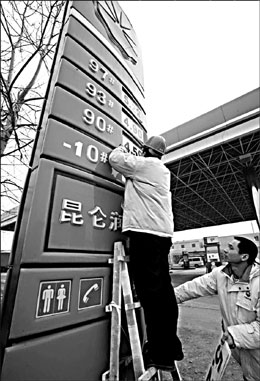Oil impact
Updated: 2008-02-18 15:06
[The author Yan Xianpu is a senior expert with the National Bureau of Statistics.]
The start of the new year was marked by oil prices reaching $100 a barrel, which could greatly affect the global economy, and especially China, the world's fastest growing economy.
Rising oil prices have become a top global concern, as it consequently brings up the price of fuel and other oil products, increases production costs, causes hikes to consumer goods prices and ultimately puts inflation pressure on the Chinese economy.
Negative influence

Skyrocketing oil prices force consumers to spend more on fuel consumption and squeeze expenditures on other commodities. In 2003, No. 93 gasoline was tagged at 3.02 yuan (42 US Cents) per liter in China, and by the end of last year had climbed 76.8 percent to 5.43 yuan per liter. For a family with a car, 200 to 350 yuan is spent per month more than 2003, an increase of 35 to 65 percent.
Further price hikes are forecast and many people intend to use other sources of transportation such as buses, subways, bicycles and walking.
High oil prices also deal a blow to the auto market, as consumers consider postponing car purchase plans. A survey shows that 80 percent of respondents say they have to rethink buying a car, while 36.6 percent say they have decided to wait for fuel prices to decline.
Most important is that the oil price increase has, to some extent, restrained consumer sentiment. Individual consumption has been the key stimulus of China's economic growth, if this sector shrinks, the economy, in general, will face difficulties.
Coal, electricity and oil are the bottleneck that restrict China's economic development, especially given that China's annual oil production has stood at 170 million tons since 1993.
The nation is still in the industrialization phase, a period during which economic growth relies considerably on oil. For example, China currently imports 50 percent of its total consumption and is the second largest oil consumer in the world after the US.
According to a survey conducted by the International Monetary Fund, if oil prices in international markets fluctuate by $1 per barrel, China's GDP will be affected by 0.046 percent.
High oil prices therefore exert an obvious impact on China's economy.
First, high oil prices restrain the development of oil-related industries such as transportation, agriculture and automobile manufacturing. Take civil aviation for example. Costs are directly brought up by escalating oil prices, since gasoline expenditures account for about one-fourth of the total.
In particular, Chinese agriculture is seriously impacted. In the last five years, the price of diesel oil commonly used in agricultural irrigation has risen 64.4 percent. Meanwhile, downstream oil products such as urea fertilizer and plastic sheet have increased 26.6 and 60 percent respectively. Consequently, agricultural production and farmers' living conditions have been greatly affected.
Secondly, high oil prices are likely to cause inflation. The escalating price of oil is sure to cause price increases for plastics, rubber and chemical fiber, which are the essential raw materials for manufacturing industries. As a result, costs in industries such as construction materials, metallurgical and petrochemicals will surge accordingly. China is now the biggest manufacturing country in the world, and the impact on Chinese manufacturers will be even worse.
In order to make a profit or simply survive, these manufacturers will shift the burden of rising costs to customers by bringing up the prices of their products, which will eventually force consumers to pay more.
According to a calculation from the International Energy Agency (IEA), if oil prices surge $10 and the price lasts for a year, China's Consumer Price Index (CPI) will be pushed up 0.8 percent. Some domestic experts also say that oil prices account for about 5 percent of all CPI fluctuation factors. That is to say, if oil prices rise 10 percent, commodity prices will increase 0.5 percent.
Complicated causes
Price escalation usually results from a shortage of supply to meet the demand. Then what has caused the imbalance between fuel supply and demand?
From 2001 to 2006, the average annual growth rate of China's GDP reached 9.8 percent, and the gross production of fuels reached 9.4 percent. However, total consumption of fuels each year increased by 10.1 percent, 0.3 and 0.4 percent higher than the previous two.
With China undergoing industrialization, manufacturing industries developing rapidly and people's living conditions improving greatly, the consumption of fuels such as oil is steadily on the rise.
High energy-consuming household appliances, such as refrigerators, TVs and air conditioners, are becoming increasingly popular.
As of the end of September 2007, urban families owned 94.8 percent of air conditioners, 2.1 times more than in 2000.
The automobile industry is also developing unexpectedly. From 2003 to 2006, the average annual sales growth in the domestic automobile market reached 1 million. As of the end of June 2007, China owned 53.56 million automobiles, among which 32.39 million were private cars, an increase of 20 percent year-on-year.
|
||
|
|

